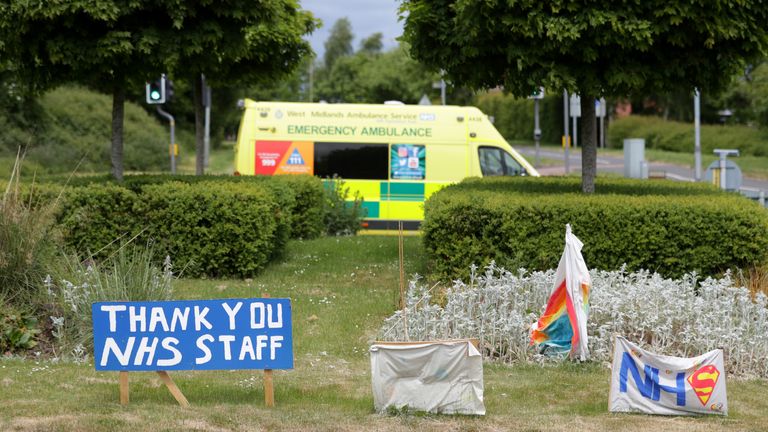Coronavirus: Racism a factor in disproportionate impact of COVID-19 on BAME groups, official review finds
The Public Health England document is based on the body's engagement with more than 4,000 people.
Tuesday 16 June 2020 17:58, UK
The disproportionate impact of coronavirus on black, Asian and minority ethnic (BAME) people is due - in part - to racism and social and economic inequalities, according to a new report.
The Public Health England (PHE) report, published on Tuesday, builds on its previous study of COVID-19 data.
After that study found there was a "disproportionate" impact of coronavirus on people from BAME groups, PHE spoke with more than 4,000 people who represent the views of those communities.
The new report says that "stakeholders pointed to racism and discrimination experienced by communities and more specifically by BAME key workers as a root cause affecting health, and exposure risk and disease progression risk".
This part of the document had already been obtained by Sky News ahead of the report's publication.
"Racial discrimination affects people's life chances - and the stress associated with being discriminated against based on race/ethnicity affects mental and physical health," the report adds.
"Issues of stigma with COVID-19 were identified as negatively impacting health-seeking behaviours.
"Fear of diagnosis and death from COVID-19 was identified as negatively impacting how BAME groups took up opportunities to get tested and their likelihood of presenting early for treatment and care.
"For many BAME groups, lack of trust of NHS services and healthcare treatment resulted in their reluctance to seek care on a timely basis, and late presentation with disease."
In its conclusions, the report found: "The unequal impact of COVID-19 on BAME communities may be explained by a number of factors ranging from social and economic inequalities, racism, discrimination and stigma, occupational risk, inequalities in the prevalence of conditions that increase the severity of disease including obesity, diabetes, CVD and asthma.
"Unpacking the relative contributions made by different factors is challenging as they do not all act independently."
:: Listen to Sophy Ridge on Sunday on , , ,
Those people who PHE spoke to were said to have "both clearly and consistently expressed" that a failure to explicitly consider ethnicity, racism and structural disadvantage in the response to coronavirus would risk a "partial understanding" of poor health outcomes and ineffective intervention.
The PHE document listed a series of recommendations for future action.
These included the comprehensive collection and recording of ethnicity data as part of routine NHS and social care systems; the funding and development of "culturally competent" COVID-19 education and prevention campaigns; and an effort to ensure that coronavirus recovery strategies actively reduce inequalities.
In a letter to the government's equalities minister Kemi Badenoch, PHE chief executive Duncan Selbie said the report's insights "make for humbling reading".
"The clear message from stakeholders was the requirement for tangible actions, provided at scale and pace, with a commitment to address the underlying factors of inequality," he added.
Marsha de Cordova, Labour's shadow women and equalities secretary, said: "This report provides even more evidence of the structural and racial inequalities which have led to the COVID-19 pandemic hitting BAME communities across the UK so very hard.
"Thousands of people and organisations have made it clear that urgent, collaborative and decisive action is needed.
"The government cannot make the same mistakes if there is a second wave of coronavirus."
Race and Revolution: Is Change Going to Come?
On Tuesday night at 8pm, Sky News will broadcast global debate show Race and Revolution: Is Change Going to Come?
It will look at the issues raised by the Black Lives Matter protests, and examine institutional racism and how we fix it.







